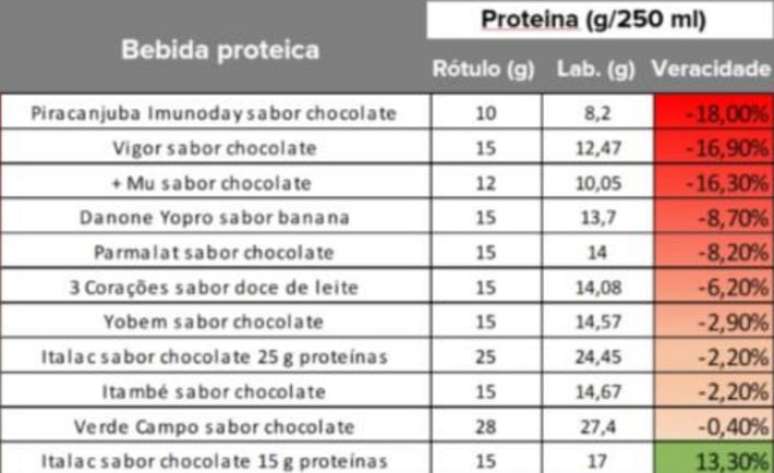Protest analyzed the composition, additives and labels of 29 milk-based drinks on sale on the market
A test carried out by Brazilian Association for Consumer Protection (Protest) They checked the composition of 11 milk drinks sold as high in protein to see if they actually contain the amount of protein indicated on the packaging.
The regulation for this type of product provides that the amount of protein cannot be less than 80% of the declared value. The result, published in issue 248 of the magazine Proteste, indicates that all the drinks contain – with a certain margin – the determined amount.
The average found was 16.4 g of protein per 250 ml of milk drink. The products that deviated the most were Piracanjuba Imunoday 10 g (with 8.2 g or 18% less than declared); Vigor 15 g chocolate flavor (with 12.47 g or 16.9% less); and +Mu 12 g chocolate flavor (with 10.05 g or 16% less).
In addition to checking the amount of protein in 11 options on the market, Proteste checked the amount of carbohydrates, additives and labels of 18 other products.
According to the association, all 29 milk-based drinks contained at least one of the six types of additives permitted by law: flavourings, colourings, emulsifiers, thickeners, stabilisers and sweeteners.
At one end, the highlight was Pirancajuba Imunoday (chocolate), with two additives. At the other, Piracanjuba 15 g (strawberry) and Italac Frutas Vermelhas had five additives.
In terms of labeling, all products had correct sales information, including a list of ingredients, warnings about allergenic ingredients and lactose, information about the use of food additives, and identification of the origin.
It was also assessed whether the drinks indicated how to store them before and after opening. In this regard, all companies obtained the highest marks.
Is it worth buying?
According to the nutritionist Desire Coelhoeditorialist for State, Daily protein requirements vary with agegender and level of physical activity. The most recent recommendation from the International Protein Board ranges from 0.8 to 2.0 grams of protein per kilogram of body weight per day (g/kg/day). The higher the level of physical activity and the desire to gain muscle mass, the higher the recommendation.
Expert advice for buying protein drinks is to compare the protein version with the original. “For example, if a 230 g yogurt promises 11 g of protein, and the conventional 170 g version has 7, the difference is very small, less than 2 g of protein, if we consider the weight. Is it worth it? It depends on your budget.”
The expert also emphasizes that it is possible to follow a healthy diet without consuming protein-enriched foods. A diet rich in fruits, vegetables and nutrients, carried out under the supervision of a nutrition professional, can meet all the needs of a healthy individual.
Source: Terra
Ben Stock is a lifestyle journalist and author at Gossipify. He writes about topics such as health, wellness, travel, food and home decor. He provides practical advice and inspiration to improve well-being, keeps readers up to date with latest lifestyle news and trends, known for his engaging writing style, in-depth analysis and unique perspectives.









